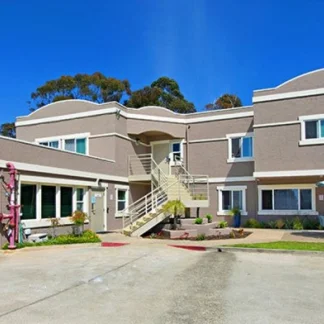Alvarado Parkway Institute Behavioral Health System Outpatient Services
Alvarado Parkway Institute Behavioral Health Systems Outpatient Treatment is loc...
Sharp McDonald Center, located in San Diego, California, is a dual diagnosis treatment center and an alcohol and drug rehab center that provides addiction treatment services to adult men and women seeking recovery. Their levels of care include residential treatment, medication-assisted treatment, partial hospitalization treatment, and aftercare services.
The residential program is best suited for individuals who need 24/7 supervision. Individual therapy, group therapy, family therapy, educational programming on a wide variety of topics, and skills-building classes are provided. The purpose of the residential program is to medically and psychologically stabilize individuals so they can achieve success through their next levels of care.
The partial hospitalization program offers a highly structured outpatient program. Individual therapy, group therapy, family therapy, and skills classes. Common areas of focus include anger management, trigger management, emotional regulation, and relapse prevention services. The medication-assisted treatment program combines FDA-approved medications with mental health counseling. The medications assist individuals by helping with withdrawal symptoms and detoxification. Mental health therapy helps clients work through underlying issues and create a positive recovery plan.
Sharp McDonald Center accepts most insurance plans, including Humana, Ambetter, HCSC, Tricare, and more. Out-of-network benefits may vary, so it’s important to verify coverage with the provider before starting treatment.
Contact us for more information: (858) 637-6920

Connect with Sharp McDonald Center by calling their admissions team directly.
(858) 637-6920 Website Get DirectionsThe Joint Commission, formerly known as JCAHO, is a nonprofit organization that accredits rehab organizations and programs. Founded in 1951, the Joint Commision's mission is to improve the quality of patient care and demonstrating the quality of patient care.
Joint Commission Accreditation: Yes
Cognitive Behavioral Therapy (CBT) is a therapy modality that focuses on the relationship between one's thoughts, feelings, and behaviors. It is used to establish and allow for healthy responses to thoughts and feelings (instead of unhealthy responses, like using drugs or alcohol). CBT has been proven effective for recovering addicts of all kinds, and is used to strengthen a patient's own self-awareness and ability to self-regulate. CBT allows individuals to monitor their own emotional state, become more adept at communicating with others, and manage stress without needing to engage in substance abuse.
Research clearly demonstrates that recovery is far more successful and sustainable when loved ones like family members participate in rehab and substance abuse treatment. Genetic factors may be at play when it comes to drug and alcohol addiction, as well as mental health issues. Family dynamics often play a critical role in addiction triggers, and if properly educated, family members can be a strong source of support when it comes to rehabilitation. The family programs are available with all levels of care and are open-ended multiple family therapy groups for both the patient and family members. Participants address early recovery issues, examine significant relationship dysfunctions and develop support networks for the entire family. All family members and patients are encouraged to attend both during and after the individual's treatment process.
Group therapy is any therapeutic work that happens in a group (not one-on-one). There are a number of different group therapy modalities, including support groups, experiential therapy, psycho-education, and more. Group therapy involves treatment as well as processing interaction between group members.
Research clearly demonstrates that recovery is far more successful and sustainable when loved ones like family members participate in rehab and substance abuse treatment. Genetic factors may be at play when it comes to drug and alcohol addiction, as well as mental health issues. Family dynamics often play a critical role in addiction triggers, and if properly educated, family members can be a strong source of support when it comes to rehabilitation. The family programs are available with all levels of care and are open-ended multiple family therapy groups for both the patient and family members. Participants address early recovery issues, examine significant relationship dysfunctions and develop support networks for the entire family. All family members and patients are encouraged to attend both during and after the individual's treatment process.
Group therapy is any therapeutic work that happens in a group (not one-on-one). There are a number of different group therapy modalities, including support groups, experiential therapy, psycho-education, and more. Group therapy involves treatment as well as processing interaction between group members.
Group therapy is any therapeutic work that happens in a group (not one-on-one). There are a number of different group therapy modalities, including support groups, experiential therapy, psycho-education, and more. Group therapy involves treatment as well as processing interaction between group members.
Alvarado Parkway Institute Behavioral Health Systems Outpatient Treatment is loc...
Dresher Street Sober Living, located in San Diego, California, is a sober living...
San Diego Center for Children - Armstrong Street, located in San Diego, Californ...
MHS Center Star ACT is located in San Diego, California. They provide alcohol an...